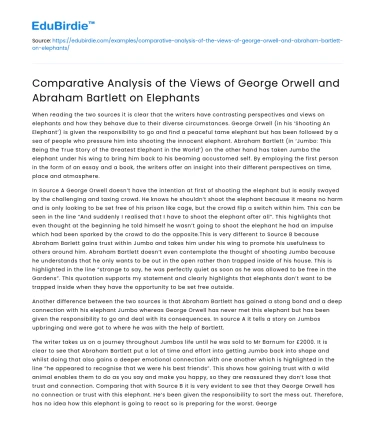When reading the two sources it is clear that the writers have contrasting perspectives and views on elephants and how they behave due to their diverse circumstances. George Orwell (in his ‘Shooting An Elephant’) is given the responsibility to go and find a peaceful tame elephant but has been followed by a sea of people who pressure him into shooting the innocent elephant. Abraham Bartlett (in ‘Jumbo: This Being the True Story of the Greatest Elephant in the World’) on the other hand has taken Jumbo the elephant under his wing to bring him back to his beaming accustomed self. By employing the first person in the form of an essay and a book, the writers offer an insight into their different perspectives on time, place and atmosphere.
In Source A George Orwell doesn’t have the intention at first of shooting the elephant but is easily swayed by the challenging and taxing crowd. He knows he shouldn’t shoot the elephant because it means no harm and is only looking to be set free of his prison like cage, but the crowd flip a switch within him. This can be seen in the line “And suddenly I realised that I have to shoot the elephant after all”. This highlights that even thought at the beginning he told himself he wasn’t going to shoot the elephant he had an impulse which had been sparked by the crowd to do the opposite.This is very different to Source B because Abraham Barlett gains trust within Jumbo and takes him under his wing to promote his usefulness to others around him. Abraham Bartlett doesn’t even contemplate the thought of shooting Jumbo because he understands that he only wants to be out in the open rather than trapped inside of his house. This is highlighted in the line “strange to say, he was perfectly quiet as soon as he was allowed to be free in the Gardens”. This quotation supports my statement and clearly highlights that elephants don’t want to be trapped inside when they have the opportunity to be set free outside.
Save your time!
We can take care of your essay
- Proper editing and formatting
- Free revision, title page, and bibliography
- Flexible prices and money-back guarantee
Another difference between the two sources is that Abraham Bartlett has gained a stong bond and a deep connection with his elephant Jumbo whereas George Orwell has never met this elephant but has been given the responsibility to go and deal with its consequences. In source A it tells a story on Jumbos upbringing and were got to where he was with the help of Bartlett.
The writer takes us on a journey throughout Jumbos life until he was sold to Mr Barnum for £2000. It is clear to see that Abraham Bartlett put a lot of time and effort into getting Jumbo back into shape and whilst doing that also gains a deeper emotional connection with one another which is highlighted in the line “he appeared to recognise that we were his best friends”. This shows how gaining trust with a wild animal enables them to do as you say and make you happy, so they are reassured they don’t lose that trust and connection. Comparing that with Source B it is very evident to see that they George Orwell has no connection or trust with this elephant. He’s been given the responsibility to sort the mess out. Therefore, has no idea how this elephant is going to react so is preparing for the worst. George Orwell is also being pressured by the crowd to end this elephants innocent life and will therefore go with the crowd because he doesn’t have any emotional link to the elephant so doesn’t care about the elephants feelings but knows the crowd will be very disappointed and ashamed of Orwell if he doesn’t go through with it. This can be highlighted in the line “The people expected It of me, and I had got to do it”.
When reading both Sources they also very different techniques in getting their ideas and perspectives across. In Source A George Orwell uses a very a conversational tone to get his point across. He makes the reader feel as if they are there experiencing it with him. Whereas in Source B Abraham Bartlett uses a more formal and professional tone in order to get his idea across. Bartlett wants to tell the story of Jumbos existence rather than an event that happened.
Did you like this example?
Make sure you submit a unique essay
Our writers will provide you with an essay sample written from scratch: any topic, any deadline, any instructions.
Cite this paper
-
APA
-
MLA
-
Harvard
-
Vancouver
Orwell vs Bartlett on Elephants.
(2022, August 25). Edubirdie. Retrieved December 22, 2024, from https://edubirdie.com/examples/comparative-analysis-of-the-views-of-george-orwell-and-abraham-bartlett-on-elephants/
“Orwell vs Bartlett on Elephants.” Edubirdie, 25 Aug. 2022, edubirdie.com/examples/comparative-analysis-of-the-views-of-george-orwell-and-abraham-bartlett-on-elephants/
Orwell vs Bartlett on Elephants. [online].
Available at: <https://edubirdie.com/examples/comparative-analysis-of-the-views-of-george-orwell-and-abraham-bartlett-on-elephants/> [Accessed 22 Dec. 2024].
Orwell vs Bartlett on Elephants [Internet]. Edubirdie.
2022 Aug 25 [cited 2024 Dec 22].
Available from: https://edubirdie.com/examples/comparative-analysis-of-the-views-of-george-orwell-and-abraham-bartlett-on-elephants/
copy






 Stuck on your essay?
Stuck on your essay?

